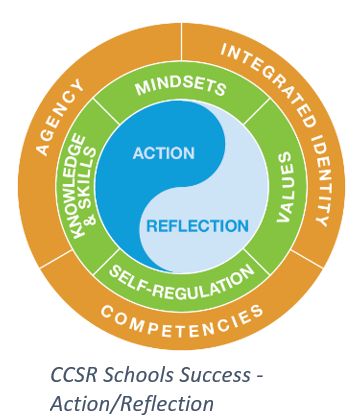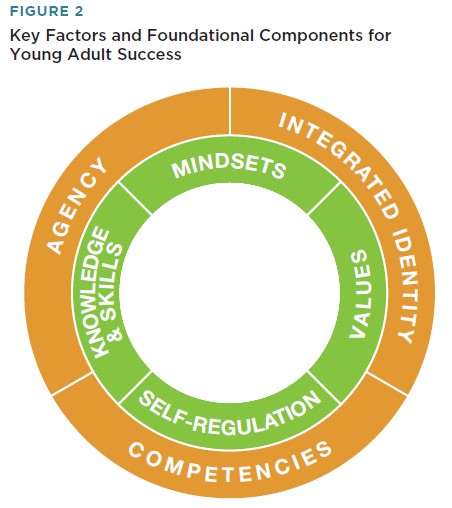Foundations for Young Adult Success: A Developmental Framework by the University of Chicago Consortium on Chicago School Research (UChicago CCSR)

This report by the Chicago Consortium on School Research and funded by the Wallace Foundation, is focused on teaching – but not in the way so much discussion of teaching occurs – this is not a list of what we ought to teach but a deep and comprehensive look at the learning needs and approaches to meeting those needs aligned with the developmental needs and characteristics of children as they grow. This deeply researched report provides a new framework for young adult success focused on student development through their school careers. This report should become a classic in our conversations and discussions about where we go from here – a few quotes:
From the Introduction to the Executive Summary:
“Every society in every age needs to grapple with the question of what outcomes it hopes to produce in raising its young. What exactly do we hope our children will be able to accomplish as adults? What vision guides our work? How do we make that vision a reality for all children? How do we better harness what is known in the research, practice, and policy arenas to ensure that all youth have what they need to successfully meet the complex challenges of young adulthood? Preparing all youth for meaningful, productive futures requires coordinated efforts and intentional practices by adults across all the settings youth inhabit on a daily basis.”
And these, quoted from the “Ingredients of Student Success:
- • Success in young adulthood depends on more than “college and career” success; a definition of success should include the multi-faceted ways individuals may seek meaning in life and contribute to the world
.
- • We organize the definition of young adult success around three key factors; these are agency, integrated identity, and competencies—and four foundational components that underlie them: self-regulation, knowledge and skills, mindsets, and values.
- • The role of the foundational components is threefold: when young people have experiences and make meaning of those experiences, each component interacts to promote the development of the other foundational components and the three key factors; they enable healthy and productive functioning at every stage of life; and they directly contribute to young adult success.
- • The four foundational components and three key factors are closely interrelated in supporting how young people act in the world and make meaning of an experience. Understanding this interrelationship can help adults provide integrative opportunities for youth to act and reflect in ways that make the most of developmental experiences, rather than targeting only one particular component or factor in isolation.
- • Noncognitive and cognitive factors should not be con¬sidered independently; they interact with each other to promote and mutually reinforce development and learning. Both are a core part of how students learn.
- • The experiences that youth encounter are always embedded within larger societal, economic, and institutional contexts that influence how youth perceive the opportunities and obstacles posed by their environments.
Those “three key factors” and “four foundational components” deserve some serious thought in the context of daily school operations and our plans to get to a better outcome (read Page 19 and following of the report thoroughly).
“this report organizes the definition of young adult success around three key factors; these are agency, integrated identity, and competencies. These factors capture how a young adult poised for success interacts with the world (agency), the internal compass that a young adult uses to make decisions consistent with her values, beliefs, and goals (integrated identity), and how she is able to be effective in different tasks (competencies). The three key factors allow a young adult to manage and adapt to changing demands and successfully navigate various settings with different cultures and expectations.”
- “… a successful transition into young adulthood will be supported by the three key factors outlined above. We want to clarify, however, that a person can have agency, integrated identity, and competencies in one setting without being able to automatically transfer those to a new setting. … Indeed, educators in successful urban high schools have often expressed frustration at the difficulty of getting students’ confidence and good habits developed in high school to transfer to post-secondary settings. Ultimately, then, the task at hand for adults who work with youth is to help young people not only build their agency, identity, and competencies in specific domains, but also help them to leverage these strengths from one arena and transfer them to tackle challenges in new contexts”
- “Underlying the capacity for the three key factors are four foundational components — a set of both cognitive and noncognitive factors. The four foundational components are self-regulation, knowledge and skills, mindsets, and values. The role of each of these foundational components is threefold. First, when young people have experiences and make meaning of those experiences, each component interacts to promote the development of the other foundational components and the three key factors. Second, they enable healthy and productive functioning at every stage of life. Finally, they directly contribute to young adult success. The foundational components develop as they are used. Over time, self-regulation, knowledge and skills, mind¬sets, and values can become internalized as lenses for seeing the world or as automatic responses (or habits) that become a core part of one’s identity; this automatic behavior supports the transfer of these foundational components across contexts.”
These quotes scratch the surface of some much deeper work. Read these two papers all the way through with highlighter in hand, discuss range of implications and options, re-consider plans & measures, act. Getting stuck? … call us, this is where we work.


